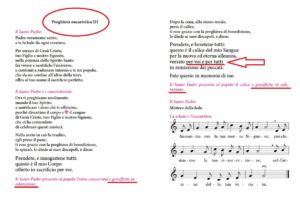 |
| Ex-Priest and Chief Director of the site Religion Digital Josè Manuel Vidal gives Pope Francis three bars of Turrón |
The difference?
InfoVaticana was founded in 2013 by Gabriel Ariza and Fernando Beltrán as a Church-loyal counterweight, so as not to leave Religion Digital the field of information.
The difference?
Religion Digital has been reporting since 2013 with enthusiasm about Pope Francis while maintaining the anti-church line.
InfoVaticana reports, increasingly critical of certain statements and gestures of Pope Francis, as it continues the course of the defense of Church and doctrine.
The difference?
While Tornielli goes to and fro under Francis in Santa Marta, advises the Pope on media issues, is part of the papal communication strategy, and receives first-hand information from Francis, Magister was stripped of accreditation by the Vatican Press Office due to his critical coverage in 2015 - after more than 30 years years of service. After a few months, he was accredited again. However, the shot in front of the bow was clear.
The same applies to InfoVaticana and Religion Digital. Under the governing Pope, it is clearly signaled who is well-liked and who is not.
The stick for InfoVaticana, carrots for Religion Digital
The Vatican Secretariat of State has appointed one of the top 10 lavender law firms in the world to initiate litigation against InfoVaticana. The Holy See accuses the news site of wanting to mislead, using the name of the Vatican in order to obtain donations. An absurd name dispute. It would be as if the city of Frankfurt would start a lawsuit against the Frankfurter Allgemeine Zeitung, or as if the cities of Zurich and New York were taking action against the Neue Zürcher Zeitung and the New York Times. InfoVaticana utilizes the Vatican in its name because most of the coverage is focused on the Holy See and the Universal Church. There are various media with a comparable name references, which the Vatican Secretariat of State has not up to now.
In this detour, the Vatican tells the news site its disapproval, which goes so far as to put pressure on InfoVaticana and harm it. Although the Vatican has denied such an intention, the lawyers have not called back.
Digital Religion in Santa Marta
On Thursday, April 19, José Manuel Vidal, Founder and Editor-in-Chief of Religion Digital, accompanied the theologian and former Jesuit Josè Maria Castillo to the Vatican. Castillo turned his back on the Jesuit order in 2007 for reasons of "mental hygiene," having for decades provoked conflicts with the ecclesiastical hierarchy with his heterodox views and his propagation of Marxist liberation theology. Castillo is a permanent columnist at Religion Digital and runs his blog on the news site with the provocative name "theology without censorship.""I told him what it was about and showed him a color print of Religion Digital and another printout of the front page of Pro Francisco that we've been hosting on our site for three years. Francis put both hands on mine and told me, 'Continue to renew a Church that goes out'.The encounter between Castillo and Vidal with Pope Francis proves what Cardinal Gerhard Muller, the Prefect of the Roman Congregation of the Doctrine of the Congregation, dismissed by Francis, that there is an "inner connection between the papists of today and the rebels of yesterday," between the great adversaries John Paul II and Benedict XVI," who yesterday "undermined the foundations of theology" and those who today present themselves as great Bergoglio followers.
Then I gave him three bars of Spanish turrón 1) . "
Text: Giuseppe Nardi
Image: Religion Digital (Screenshots)
Trans: Tancred vekron99@hotmail.com
AMDG












